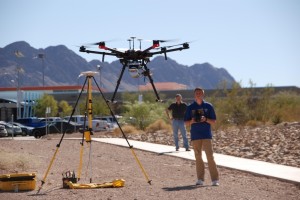By Kalani Reyes
New degree called Unmanned Aviation System Technology, or drone technology, is on the books for College of Southern Nevada to likely start next fall.
The two-year degree program is one-of-a kind in Las Vegas, said CSN Applied Technology Professor Art Eggers, creator of the drone program. The curriculum heavily emphasizes learning how to build, program, fly and repair drones.
“This is relevant because there is a need,” Eggers said. “This is going to be a degree that is needed and a workforce area that is going to provide jobs in … Nevada and we’re hoping nationwide. We want to put our program on the map.”
When asked about the classes in the degree, Eggers stated, “The program is primarily an engineering technology program and I always put that out in front for people and students that think that they want to do it. I mean, it’s not just flying a drone.”
Though drone piloting sounds like fun, just as automobiles are moving towards autonomous drivers so is the drone industry. This is the primary differentiator between CSN’s program and courses offered at other schools that coach individuals on how to be drone pilots, Eggers said. Before students learn how to fly their drones they must learn how to build, program, calibrate and test it. When the drones are ready for flight, they will crash it and the students will learn how to repair or rebuild it.
As part of the program students will take classes qualified by the Federal Aviation Administration to learn Part 107 regulations. This includes operational limitations, remote pilot in command certification, and responsibilities and aircraft requirements. If students have a Part 107 they can be a pilot commercially.
The potential economic benefit of integrated unmanned aerial systems into the nation’s airspace is estimated to equal up to $82 billion and create up to 100,000 jobs between 2015 and 2025, according to a 2013 report by the Association for Unmanned Vehicle Systems International.
Jobs for graduates were one of the top concerns brought up at CSN’s third UAS Industry Advisory Committee meeting on Oct. 20. In attendance were people in the drone industry from commercial, government and academics from Las Vegas and the surrounding areas. Members of different communities chimed in on jobs that exist and will grow as the industry matures. Jobs mentioned included the following: photography, agriculture, construction and consulting, among others.
 James Spear, UAV expert who does research and development for an international drone company YUNEEC, attended the meeting. He shared that the CSN program will give students a leg-up on how to program and trouble shoot aircraft. “It’s going to make things a lot easier coming out of this program knowing the different systems and knowing what’s going on. The technician side is where we need more [people],” Spear added. “The whole pilot thing is a small bubble and it’s going to burst. But being able to say, ‘Hey I have a [Part] 107. I am a UAS pilot. I can fix it’ is what this program is about. The fixing and building and doing all those things, that’s where the money’s going to be in my opinion.”
James Spear, UAV expert who does research and development for an international drone company YUNEEC, attended the meeting. He shared that the CSN program will give students a leg-up on how to program and trouble shoot aircraft. “It’s going to make things a lot easier coming out of this program knowing the different systems and knowing what’s going on. The technician side is where we need more [people],” Spear added. “The whole pilot thing is a small bubble and it’s going to burst. But being able to say, ‘Hey I have a [Part] 107. I am a UAS pilot. I can fix it’ is what this program is about. The fixing and building and doing all those things, that’s where the money’s going to be in my opinion.”
Director of the CSN Engineering Technology Program Professor Joe Miller stated, “I think it’s going to serve local industry needs, thus it will provide a path to well-paying jobs for students once they get the degree. It is a technical degree; students need to understand the industry they’re focusing on.”
“This is the sunrise for the golden age of drones,” said Chief Executive Officer Jonathan Daniels of Praxis Aerospace Concepts International, a drone consulting and manufacturing company in Henderson.
Before businesses can fly drones, they need authorizations from the FAA. “In the last five years we have seen significant growth in the industry,” Daniels said. “The FAA has increased commercial authorizations from eight in 2014 to over 60,000 in September of 2017.”
Students can start taking classes in this program now. All the classes for this discipline currently exist in the catalog and can be taken to satisfy the requirements when the degree becomes available.
Some exciting news that Eggers was happy to announce was the availability of three need-based $10,000 scholarships for minorities who want to enroll in the program, funded by a generous donor.




